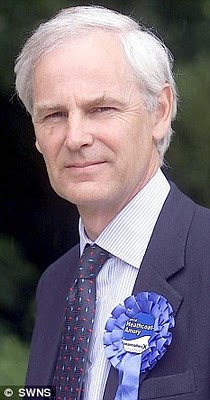
This is David Heathcoat Amory: a more fierce British patriot and arch-Eurosceptic you would be hard pressed to find on the Conservative benches. Yet he lost the seat of Wells to a Europhile Liberal Democrat by 800 votes, while UKIP picked up 1711.
Let us not pretend that UKIP supporters would not vote for a Conservative candidate if Conservative policy on the EU were more robust. There is a fiction that UKIP are composed of ex-members of all parties, and that at their meetings you will find unreconstituted Socialists and a hefty proportion of LibDems, all united in their desire to leave the European Union.
This is nonsense. UKIP is a lost tribe of Conservatism: they favour small government and low taxation; they support the Established Church, wish to retain the Act of Settlement, expand grammar schools and introduce controlled immigration. They are all innately conservative in disposition and Whiggish in philosophy. Their raison d'être is for the UK to leave the EU. But not without a referendum of the people.
That is to say, UKIP is really the Referendum Party, for that is the only concession they attempted to extract from the Conservative Party.
Yet that was too much for David Cameron.
Even though a referendum pledge is included in the LibDem manifesto, such a demand is an unacceptable exaction when made by UKIP. David Cameron would rather deal with those whose political philosophy is antithetical to conservatism than with those whose conservatism is 'Radical' (or, in the vernacular, 'right wing').
And so we are in a position of having to barter away the voting system and all manner of core policies and manifesto pledges in order to accommodate Nick Clegg - the man who spectacularly failed in this General Election leading the party which came a very poor third.
It is estimated that UKIP helped deprive the Conservatives of at least ten seats by fielding candidates in constituencies the Tories had a very good chance of winning. They might even be blamed for keeping Ed Balls in situ, for he won by only 1119 votes while UKIP took 1506.
ConservativeHome have a list of how David Cameron might have secured a majority if he had been prepared to enter into talks with former-Tory peer
Lord Pearson:
•Bolton West: Labour 18,329; Conservative 18,235; UKIP 1,901
•Derby North: Labour 14,896; Conservative 14,283; UKIP 829
•Derbyshire NE: Labour 17,948: Conservative 15,503; UKIP 2,636
•Dorset mid & Poole: Labour 21,100; Conservative 20,831; UKIP 2,109
•Dudley North: Labour 14,923; Conservative 14,274; UKIP 3,267
•Great Grimsby: Labour 10,777: Conservative 10,063: UKIP 2,043
•Hampstead & Kilburn: Labour 17,332; Conservative 17,290; UKIP 408
•Middlesbrough South: Labour 18,138; Conservative 16,461; UKIP 1,881
•Morley (Ed Balls): Labour 18,365; Conservatives 17,264; UKIP 1,506
•Newcastle-Under-Lyme: Labour 16,393; Conservatives 14,841; UKIP 3,491
•Plymouth Moor View: Labour 15,433; Conservatives 13,845; UKIP 3,188
•Solihull: Liberal 23,635; Conservatives 23,460; UKIP 1,200
•Somerton & Frome: Liberal 28,793; Conservatives 26,976; UKIP 1,932
•Southampton Itchen: Labour 16,326; Conservatives 16,134; UKIP 1,928
•St Austell & Newquay: Liberal 20,189; Conservatives 18,877; UKIP 1,757
•St Ives: Liberal 19,619; Conservatives 17,900; UKIP 2,560
•Telford: Labour 15,977; Conservatives 14,996; UKIP 2,428
•Walsall North: Labour 13,385; Conservatives 12,395; UKIP 1,737
•Walsall South: Labour 16,211; Conservatives 14,456; UKIP 3,449
•Wells: Liberal 24,560; Conservatives 23,760; UKIP 1,711
•Wirral South: Labour 16,276; Conservatives 15,745; UKIP 1,274
Of course, hurt and disappointed Conservatives will blame UKIP for these losses, but the reality is that it was present Conservative policy which lost them. Senior Labour ministers who were 'saved by UKIP' include not only Ed Balls, but John Denham, Phil Woolas and Ian Austin.
And now for the shabby deals. And it is more than a little nauseating to watch and hear David Cameron and Gordon Brown fawning for Nick Clegg's support, obsequious and flattering in their expressions of potential accommodation. "Which of you shall we say doth love us most?" asks Clegg, "That we our largest bounty may extend
Where nature doth with merit challenge."
Gordon Brown responds that he loves Nick "more than words can wield the matter;
Dearer than eye-sight, space, and liberty;
Beyond what can be valued, rich or rare."
What shall Lord Pearson speak? Love and be silent.
And David Cameron responds: "Sir, I am made
Of the self-same metal that Nick is,
And prize me at his worth. In my true heart
I find he names my very deed of love;
Only he comes too short: that I profess
Myself an enemy to all other joys,
Which the most precious square of sense possesses;
And find I am alone felicitate
In your dear highness' love."
Then poor Lord Pearson!
And yet not so; since, I am sure, my love's
More richer than my tongue.
And for those who are not familiar with the story, read it and weep.